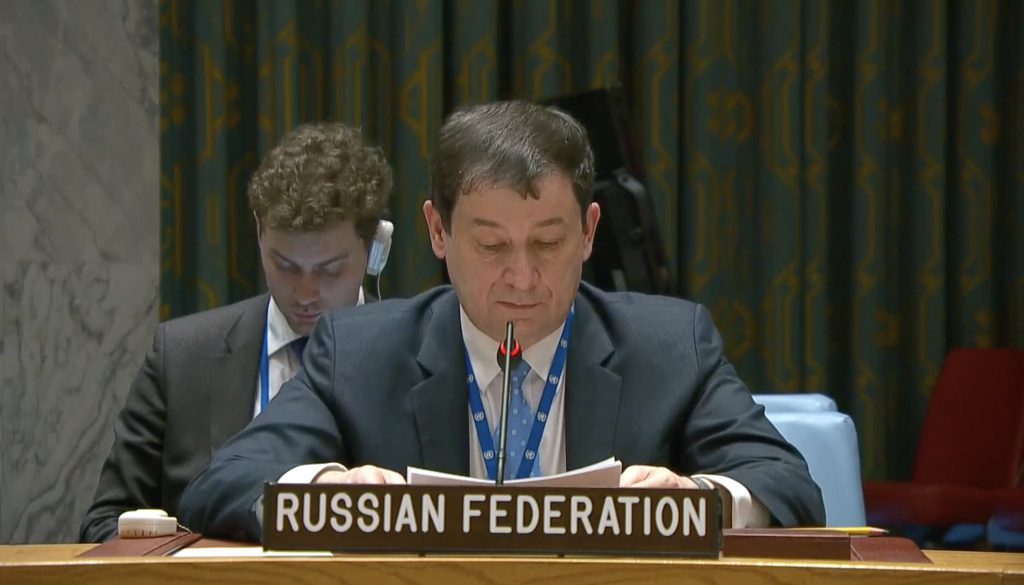Statement by First Deputy Permanent Representative Dmitry Polyanskiy at UNSC briefing on the DPRK
Mme.President,
We thank ASG Khiari for the briefing.
Russia is opposed to any military activity that poses threats to the security of the Korean peninsula and North-East Asian states. Our position on this matter is well-established. We repeatedly underscore the need for all sides to exercise restraint and take practical steps to prove ready to resume dialogue in the spirit of prior agreements and obligations. However instead of this we see a rapid build-up of military activity in North-East Asia that exacerbates the situation and delays political and diplomatic resolution of the problems of the Korean Peninsula. We always say that those problems must be considered as a cluster. We are convinced that the Security Council should take into account all factors and see what steps are taken by the involved states so as to be cognizant of the complete picture of the developments.
Today we heard a lot about a missile launch, yet nothing was said i.a. about the fact that shortly before that, the authorities of the Republic of Korea and the United States had announced command-and-staff training exercises to include, as reported by the media, visits to a port where American nuclear-armed submarines are stationed; and also field exercise “Freedom Shield” to take place in March. The next day after the launch, the US and Korea held joint air drills with participation of strategic bombers.
Those are but a few examples showing that the situation in the region continues as a “vicious circle”. Last week, the Ministry of Defense of South Korea issued a new edition of its defense doctrine, the so-called White Book, where the DPRK was qualified as an "enemy" with reference to a similar definition against the Republic of Korea by the Central Committee of the Korean Workers’ Party, announced in December 2022
Missile tests is DPRK’s response to the unprecedented military maneuvers in the region that are carried out under the "umbrella" of the United States and have an obvious anti-Pyongyang orientation. Further spiral-up of this escalation brings us closer to a dangerous line, beyond which events can assume an uncontrollable character.
We regret that the US and allies ignored the steps taken by Pyongyang in 2018-2019, and thus failed to significantly improve the situation in the region. What’s more, a number of states assumed such a position that did not let the Council ease tension. Then came calls by Pyongyang to Washington to stop hostile steps and keep from further build-up of tension. However those were also left unheeded, and opportunities for a dialogue missed.
We repeatedly stressed that the US and its allies bear special responsibility for this situation. Attempts to coerce the DPRK to disarm unilaterally with the help of sanctions and forceful pressure as part of so-called extended deterrence concept will not bring the results that Washington has apparently anticipated. As a result, their rhetoric becomes more and more belligerent and, unfortunately, backed by real action.
Clearly, this leads to an impasse that poses a direct threat to international peace and security. We remain hopeful that the current trend towards intensification of tension will give way to de-escalation based on talks. We once again underscore that there is no alternative to a multilateral political-diplomatic process, aimed at creating such an architecture of peace in the North-East Asia that should take into account legitimate concerns of all states of the region and envisage reliable security guarantees. We are prepared for such engagement and remind that Russia and China have elaborated a plan of action for comprehensive settlement on the Korean Peninsula that offers the involved states to take concrete steps at certain tracks.
Mme.President,
I would like to emphasize that UNSC resolutions on the DPRK also prescribe to look for a political and diplomatic solution to this issue. We are disappointed by the fact that every time those resolutions are mentioned, only their sanctions-related aspects are raised, even though it has long become obvious that the policy aimed at enhancement of sanctions pressure on Pyongyang that is futile by its form and inhumane by nature must stop. The negative cumulative effects of international and unilateral restrictive measures that exacerbate the difficult situation of the population of the DPRK are growing exponentially.
On a separate note, constant UNSC meetings on North Korean agenda that take place in the conditions when some members of the Council are not ready for a constructive dialogue and are only prepared to criticize the DPRK do not help to resolve this situation. These countries show extreme selectivity in what the Council supposedly should or should not discuss. Agenda of the meetings on North Korea that they request does not envisage a task of identifying steps that the Security Council could take to facilitate the search for a peaceful solution through negotiations. We call on Security Council members to conjugate efforts in pursuit of this goal. We underscore again that the Chinese-Russian draft resolution of political and humanitarian aspects that is called to fulfil this task remains on the table.
Thank you.
